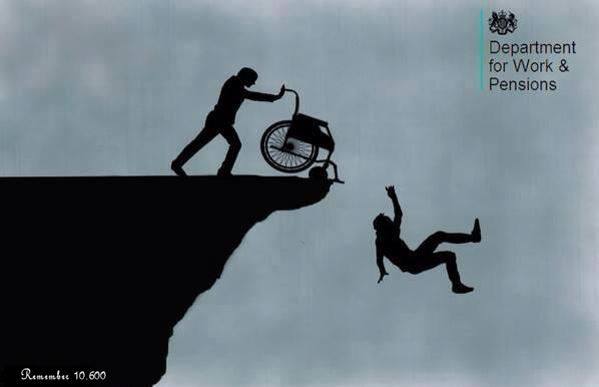
By John Pring Disability News Service 15th February 2018
A Deaf chief executive has won the right to question the government’s “discriminatory” cap on Access to Work (AtW) payments in the high court, in the latest legal challenge to the Department for Work and Pensions’ (DWP) disability policy agenda.
David Buxton, chief executive of Action on Disability in London, is one of many British Sign Language (BSL)-users who have been hit by the imposition of the cap on payments made by the AtW scheme, which provides disabled people with funding to pay for some of the extra disability-related expenses they face at work.
Now the high court has ruled that Buxton’s legal challenge can go ahead, with his lawyers set to argue – under the Equality Act 2010 – that the cap breached the public sector equality duty and subjected him to indirect discrimination.
His judicial review case is being funded by the Equality and Human Rights Commission.
It comes just weeks after another legal challenge forced work and pensions ministers into a climbdown over new personal independence payment rules that were found by the high court to be unlawful and “blatantly discriminatory”.
And earlier this month, a terminally-ill man, TP, won permission for a judicial review of the financial impact of the introduction of universal credit on disabled people with high support needs, through the loss of the severe disability premium and enhanced disability premium.
Disability News Service reported last year how Buxton had been told that AtW would only provide him with enough support to pay for interpreters three days every week.
He began his full-time job in London in May, and was immediately hit by the cap, which was introduced for new AtW claimants in 2015 and is due to affect existing claimants from April this year.
Less than three months ago, the government launched its 10-year work, health and disability strategy, which aims to increase the number of disabled people in work by one million by 2027.
But campaigners believe that the AtW cap, which currently limits the annual support that individuals can be awarded under the scheme to £42,100 a year, has had a disproportionate impact on the job and career prospects of Deaf BSL-users and disabled people with high support needs.
They say it places them at a disadvantage in the workplace, effectively removing employment support from those with the most complex needs and placing them at a disadvantage when trying to get into, stay in and get on in paid work.
Buxton said: “As a chief executive, it cannot be right that my career is impacted by limiting my language and communication needs because I am Deaf and use BSL.
“There is some way to go yet but the support from the Equality and Human Rights Commission and my legal team are signs that this is a case which could challenge and change existing practices, decisions and future provision.”
Buxton’s case is being supported by Inclusion London’s Disability Justice Project, and the StopChanges2AtW campaign.
Ellen Clifford, Inclusion London’s campaigns and policy manager, said: “We’re pleased that permission for judicial review has been granted as we see the cap as clear discrimination, effectively barring people with certain impairments from the same employment opportunities as others.
“We hope that the case will be heard as soon as possible because Deaf and disabled people are already suffering under the impact of the cap, with Access to Work writing to ask to meet with employers to look at what aspects of a person’s job can be taken away to meet the reductions in support.
“However, the cap is only one aspect of the many current failings with Access to Work.
“Limits to individual awards, hostile questioning by advisors, and financial and administrative errors on an alarming scale are all adversely impacting on thousands of Deaf and disabled people and the interpreters and personal assistants we employ on a daily basis.
“It’s a scandal that would have received much more attention had the government not at the same time been denying disabled people’s basic human rights through benefit cuts and the social care crisis.”
Buxton’s solicitor, Anne-Marie Jolly, from Deighton Pierce Glynn, said: “Mr Buxton’s claim makes the case that the Access to Work cap discriminates against Deaf and disabled people and fails to take account of the impact on them of such a regressive move.
“The cap perversely impacts on those with the most demanding jobs and highest support needs, the overwhelming majority of whom are Deaf BSL-users, preventing them and their employers or businesses from reaching their fullest potential.”
Research commissioned by Inclusion London, and published in October, described AtW as “a cornerstone of the movement for equality and civil rights for Deaf and disabled people in the UK” but found that the future of the AtW scheme was in jeopardy because of “bureaucratic incompetence” and a cost-cutting drive to reduce people’s support packages.
DWP said it could not comment on an ongoing legal case.
